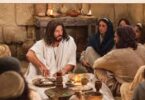 Theme: We are called to imitate God in His Forgiveness and Mercy
Theme: We are called to imitate God in His Forgiveness and Mercy
Scripture readings: Lev. 19:1-2, 17-18; Ps. 102:1-4, 8, 10, 12-13; 1 Cor. 3:16-23; Mt. 5:38-48
Two farmers, John and James, were good friends until a dispute arose between them over a piece of land. Unable to settle the issue among themselves, they went to court. The court decided in favour of John. James was bitter, and put poison in Johns well, not a fatal dose, but enough to give it an obnoxious taste. John was very angry. His neighbours heard about it and declared that James should be made to pay for what he had done. In retaliation, John was about to go by night and poison James well when a stranger arrived at his house. On hearing the story the stranger agreed that it was a pretty nasty situation, but he wouldn’t agree with retaliation. The stranger said, I’ve a better idea. I’ll show you in the morning.
The idea was to clean out the well and the stranger offered to help. It was a messy business and took them two whole days. Then they ran the fresh water, drank it, and declared that it was clean, John also drank from the well, but insisted that he could still taste the poison. To which the stranger replied, Take it from me, the water is perfect. But you will continue to taste the poison until you do just one more thing. What’s that? asked John earnestly. You must forgive your neighbour. You have got rid of the poison from the well, but not the poison that lodges in your mind and heart. Not until you let go of your bitterness, and forgive your brother, will the water taste right. That evening John went over to his neighbour and made peace with him. When he came back he tasted the water again. This time it tasted good. (Flor McCarthy in Sunday and Holy Day Liturgies) The evil was conquered by forgiveness and mercy! God also calls us to show forgiveness and mercy. This is the lesson that today’s liturgy offers us today.
We are called to attain holiness through the love of our neighbour. The first reading from the Book of Leviticus gave various laws to the Jews for their daily living. All these laws were given to attain holiness in their laws for God called them to be holy as He was holy. God is merciful and forgiving. He does not take revenge. The people of Israel were called to imitate God. The love of neighbour was one of the commands from God to imitate Him. The command said that not to hate, not to take vengeance, not to keep grudge against the enemy but to love neighbour as yourself. The rabbis twisted these laws and defined neighbour in narrow perspectives. For them, a neighbour was someone from their own country or a friend. Through the wrong interpretation of the laws, the Jews at the time of Jesus missed the mark. They failed to imitate God. They could not make any difference in their live as well in the lives of people.
The Psalmist narrates in today’s psalm the true nature of God. He says, God forgives. He heals, He redeems. He is love and compassion. He is slow to anger. He is rich in mercy. He does not treat us for our sins. He removes our sins. The God is full of compassion and love. The Israelites were called to be Holy as their God was Holy.
At the time of Jesus, the Jews read the scriptures but failed to follow God and His commandments. The scribes and Pharisees portrayed as though they were the champions of the laws. They followed laws meticulously and asked everyone to do the same. They thought that they imitated God by following the laws. Jesus challenged their righteousness, their ways of life. This was the most radical teachings of Jesus in sermon on mount and forms the central part of sermon on mount. Jesus grabbed the core issues which were present in human nature: violence and revenge. He highlighted the old law of Talion. It said, tit for tat (eye for an eye, tooth for a tooth). It was prevalent in the code of Babylonian King Hammurabi. The same law was repeated in the book of Exodus. (Ex. 21:23-35) The Jews followed this principle just to avoid flights among the tribe. Jesus presented totally different approach. He proposed his disciples the ways of non-violence and no-vengeance.
Jesus gave five examples to bring out lesson for His disciples. When someone strikes on the cheek then offer him another. Someone sues you for a tunic then offer him the whole cloak. Someone order you to go for one mile, then go two miles with him. if someone ask, give them; and some wants to borrow, do not turn them away. In each of these examples, Jesus demanded from his disciples a deep solid commitment that goes beyond external reality. It is interesting to note that Jesus practiced what he preached. He offered himself to be insulted when the soldiers mocked him. He gave his entire tunic when they hanged him on the cross. He did not challenge the authorities (Roman as well as Jewish). He walked extra mile on way to Golgotha. He gave everything in his life (even the last drop of blood) and allowed people to borrow from him without expecting them to return. Jesus gave his disciples a basic principle of life i.e. to love. Where there is love, there is no vengeance, hatred, revenge, etc. Jesus forgave us on the cross. He did not show any revenge. He did not come back to us with vengeance to meet us.
St. Paul while writing to the Corinthians, reminded that they are temples of the Holy Spirit. In other words, we need to recognise the presence of God in life. While dealing with people, this gentle reminder helped his people to resolve their issue amicably. St. Paul who was himself involved in the persecution of fellow Christians. He realised that if he had to imitate Christ then he had the follow the commandment of Jesus in his life.
The forgiveness and mercy win the most difficult battles in our lives. The story of two farmers reminds the same. A reading from the book of Leviticus and Psalm remind us that God is full of mercy and compassion. He is forgiving God. We are called to imitate God in our lives. Jesus has shown us how to do it by his words and deeds. St. Paul also did the same. There is an invitation to be perfect as the heavenly father is perfect in showing mercy and forgiveness. This is the core teaching of Christ. It has to start first in our families, communities. Let us pray that in this Holy Eucharist that we may strive to imitate God in His forgiveness and mercy.
Fr. Alex D’Mello






